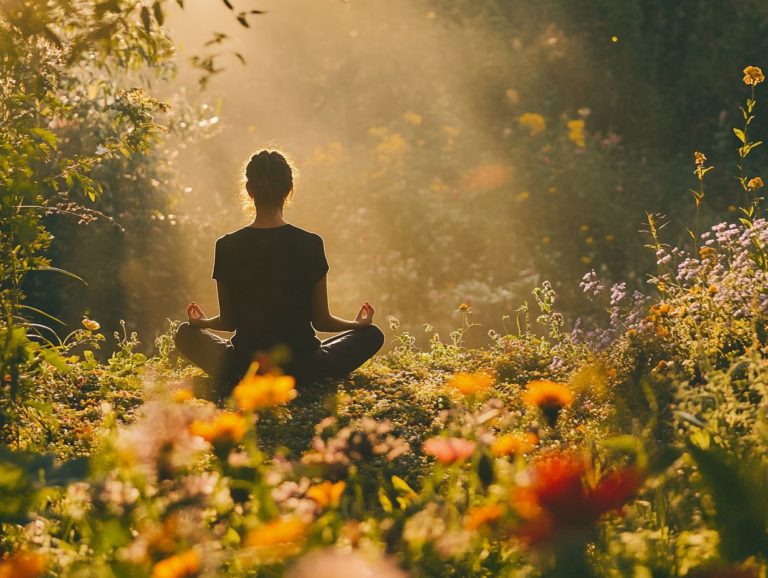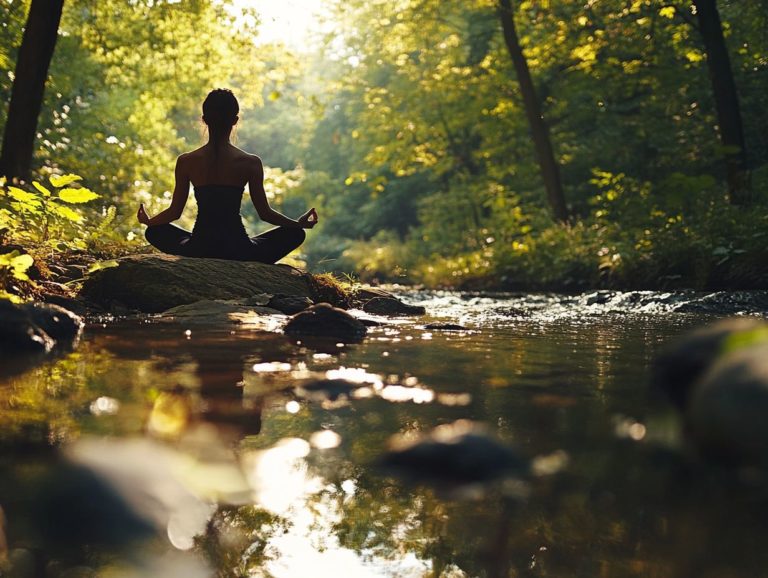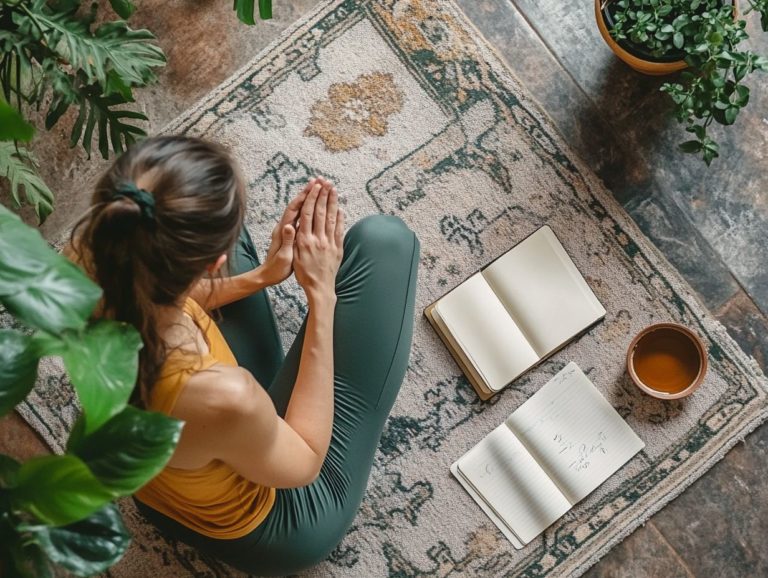How to Overcome Anxiety with Mind-Body Practices
Anxiety can often feel like an overwhelming feeling. Recognizing its causes and symptoms is the first step toward finding relief.
Let s explore how your thoughts and feelings affect your anxiety. You ll learn effective practices like meditation, yoga, and breathing techniques that can help ease anxiety.
You will also find practical strategies to include these practices in your daily life. We ll also look at other options, such as lifestyle changes and therapy, to guide you toward peace.
Contents
- Key Takeaways:
- Understanding Anxiety
- Mind-Body Connection in Anxiety
- Mind-Body Practices for Anxiety Relief
- Incorporating Mind-Body Practices into Daily Routine
- Additional Strategies for Managing Anxiety
- Preguntas Frecuentes
- 1. Qu son las pr cticas mente-cuerpo y c mo pueden ayudar con la ansiedad?
- 2. C mo ayuda la meditaci n a superar la ansiedad?
- 3. Puede el yoga ayudar con la ansiedad?
- 4. C mo pueden los ejercicios de respiraci n profunda aliviar la ansiedad?
- 5. Es posible superar la ansiedad solo con actividades que conectan mente y cuerpo?
- 6. C mo puedo incorporar actividades que conectan mente y cuerpo en mi rutina diaria?
Key Takeaways:
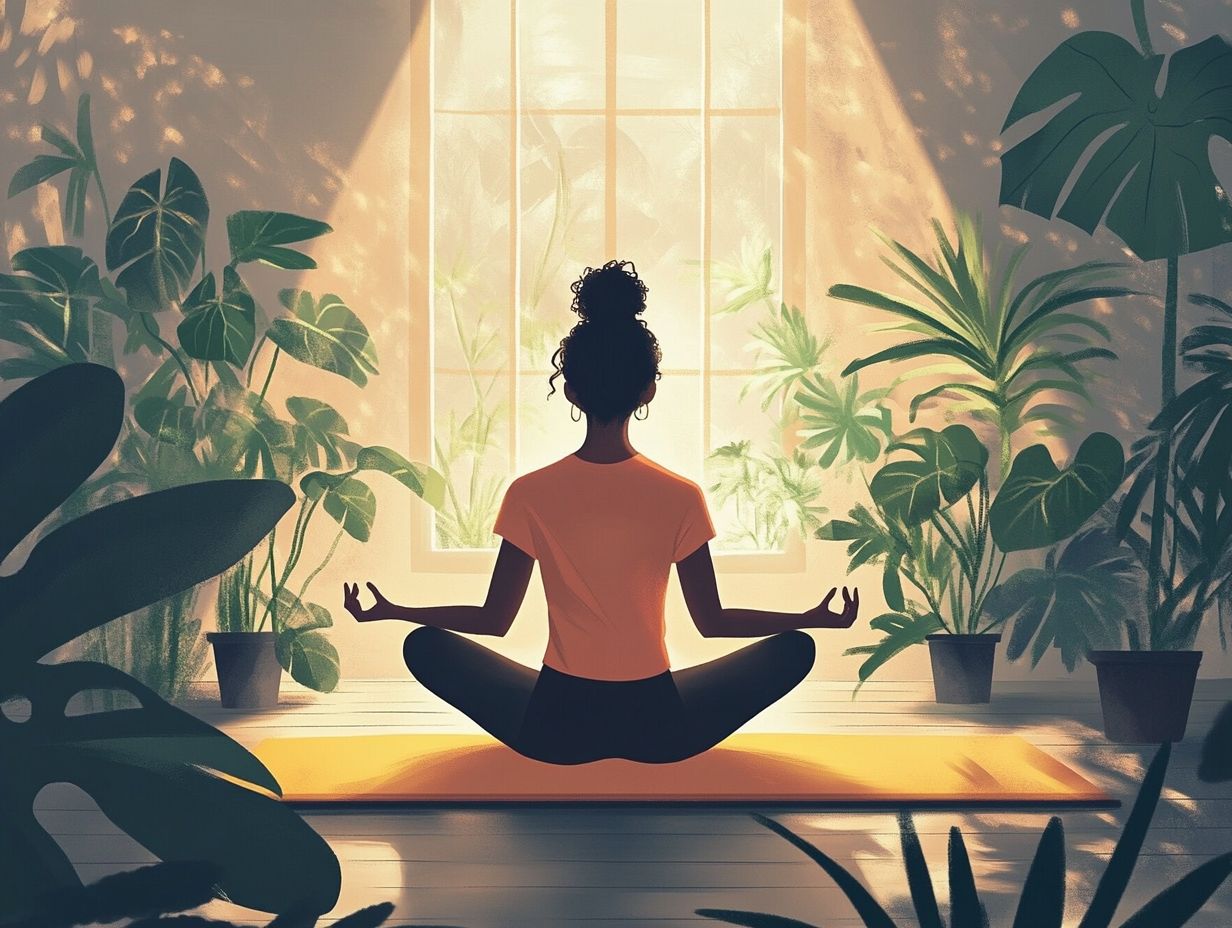
Understanding Anxiety: Knowing the causes and symptoms can help you manage anxiety better.
Mind-Body Connection: Your thoughts and feelings significantly impact your anxiety. Mind-body techniques can help break this cycle.
Incorporating mind-body practices: Regularly adding practices like meditation, yoga, and breathing techniques into your routine can reduce anxiety and enhance well-being, as highlighted in the benefits of mind-body practices for stress relief.
Understanding Anxiety
Understanding anxiety helps in managing its impact on mental health and daily life. Anxiety disorders affect millions globally and often result in physical tension and negative emotions.
By exploring cognitive techniques and mindfulness-based cognitive behavioral therapy (CBT), you can find a path toward overcoming anxiety. Recognizing symptoms and causes allows you to develop strategies that mitigate anxiety’s effects on relationships and well-being.
Causes and Symptoms
The causes and symptoms of anxiety are complex, stemming from genetic and environmental factors. You may find that your anxiety stems from personal experiences, such as childhood trauma or stressful life events.
This complexity can lead to symptoms like agitation and sleep disturbances. Fortunately, problem-solving and mindfulness-based CBT can effectively help manage anxiety by addressing underlying triggers.
Mind-Body Connection in Anxiety
The mind-body connection is crucial for understanding anxiety. Your thoughts and feelings affect both your mental and physical health.
Mindfulness and CBT emphasize integrating mind and body by addressing anxiety-inducing thoughts that cause physical tension. Recent neuroscience research highlights this relationship, showing the importance of holistic approaches to mental health.
How Thoughts and Emotions Affect Anxiety
Anxiety-provoking thoughts often lead to feelings of distress. You might face situations like public speaking or tight deadlines that trigger these feelings.
During these moments, negative self-talk can increase stress and self-doubt. Mindfulness-based CBT techniques can help you pause and evaluate your reactions, allowing you to reframe your thoughts from panic to calm.
This practice not only reduces immediate anxiety but also promotes a healthier mental state over time.
Mind-Body Practices for Anxiety Relief
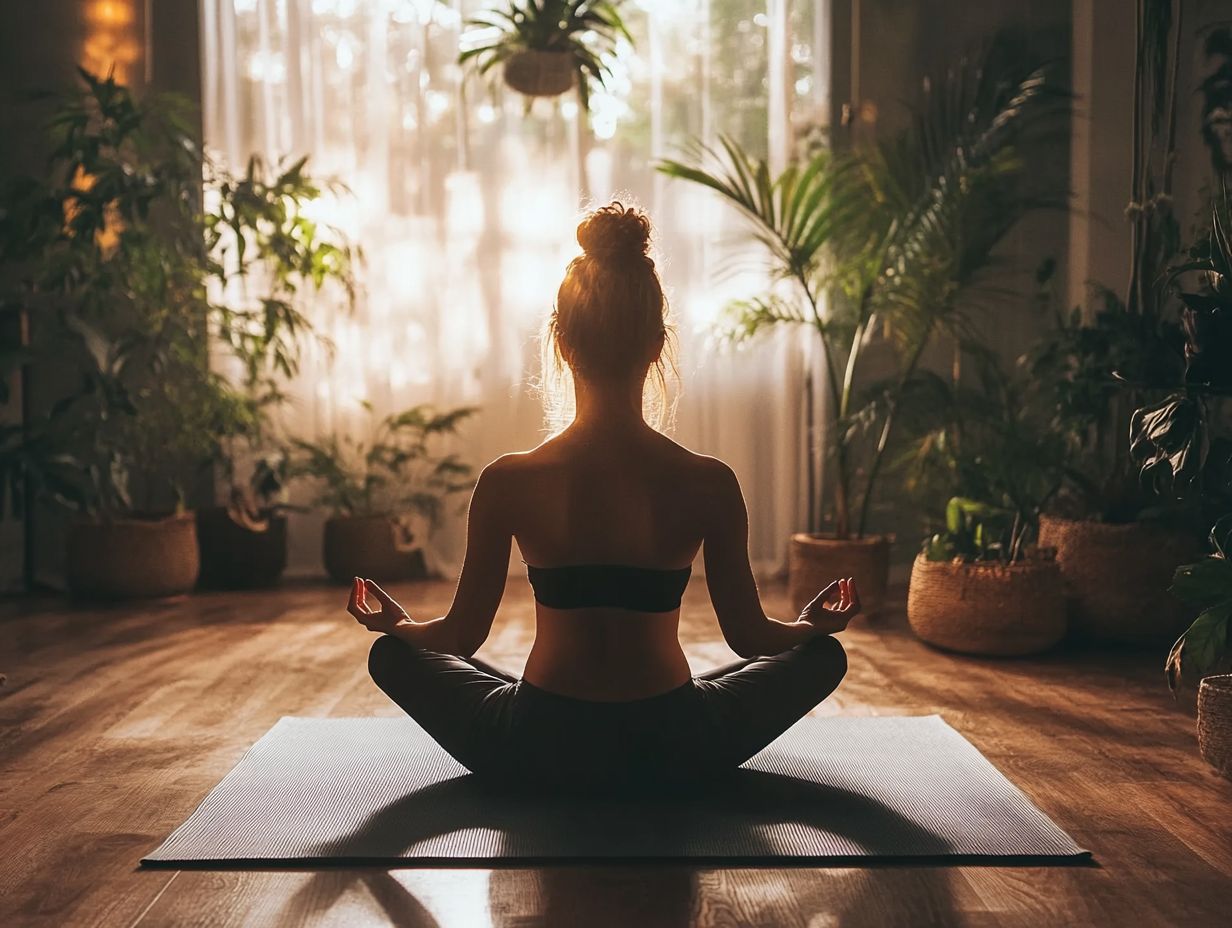
Mind-body practices like mindfulness, meditation, yoga, and breathing techniques are exceptional tools for alleviating anxiety, and they can also enhance your connections. Learning how to use mind-body practices for better relationships can further improve your emotional well-being.
They promote a better connection between your body and mind, enhancing your emotional well-being in profound ways.
Meditation
Meditation is a powerful mindfulness practice that offers significant anxiety relief by nurturing a calm mental state and improving overall mental health.
Through techniques like focused breathing and visualization, you can train your mind to escape from the constant stress and worries. Consistent practice helps you feel more in control of your reactions to everyday challenges.
Creating a calm mind can make a big difference. By incorporating meditation into your daily routine, you can unlock improvements in your emotional well-being, transforming it into an invaluable asset for anyone seeking peace of mind.
Yoga
Yoga blends physical postures, breath control, and mindfulness, providing profound benefits for anxiety relief and the connection between body and mind.
With various styles of yoga tailored to meet diverse needs, it s accessible to everyone.
For instance, Hatha yoga emphasizes gentle movements and breath awareness, promoting relaxation and easing muscle tension.
Vinyasa invites you into flowing sequences, distracting your mind from anxious thoughts.
Restorative yoga prioritizes deep relaxation and encourages a meditative state, significantly boosting your emotional well-being.
Immersing yourself in these practices nurtures a heightened sense of presence and mindfulness, allowing you to cultivate awareness around your feelings and sensations an essential foundation for managing anxiety effectively.
Breathing Techniques
Breathing techniques are essential mindfulness practices that can significantly help you find relief from anxiety by promoting relaxation and emotional regulation.
These methods provide simple yet powerful ways to manage stress effectively. For example, consider belly breathing, which focuses on engaging your diaphragm instead of your chest for a greater intake of oxygen.
Practicing this deep breathing alleviates physical tension and activates your body s relaxation response. Another effective method is the 4-7-8 technique, guiding you to inhale for four counts, hold for seven, and exhale for eight.
This rhythmic practice calms your nervous system and reduces feelings of anxiety, making it an accessible tool for when you feel overwhelmed. Incorporating these techniques into your daily routine fosters resilience and enhances your overall well-being.
Incorporating Mind-Body Practices into Daily Routine
Incorporating mind-body practices into your daily routine is essential for nurturing long-term mental health and enhancing your anxiety management strategies.
Tips for Consistency and Effectiveness
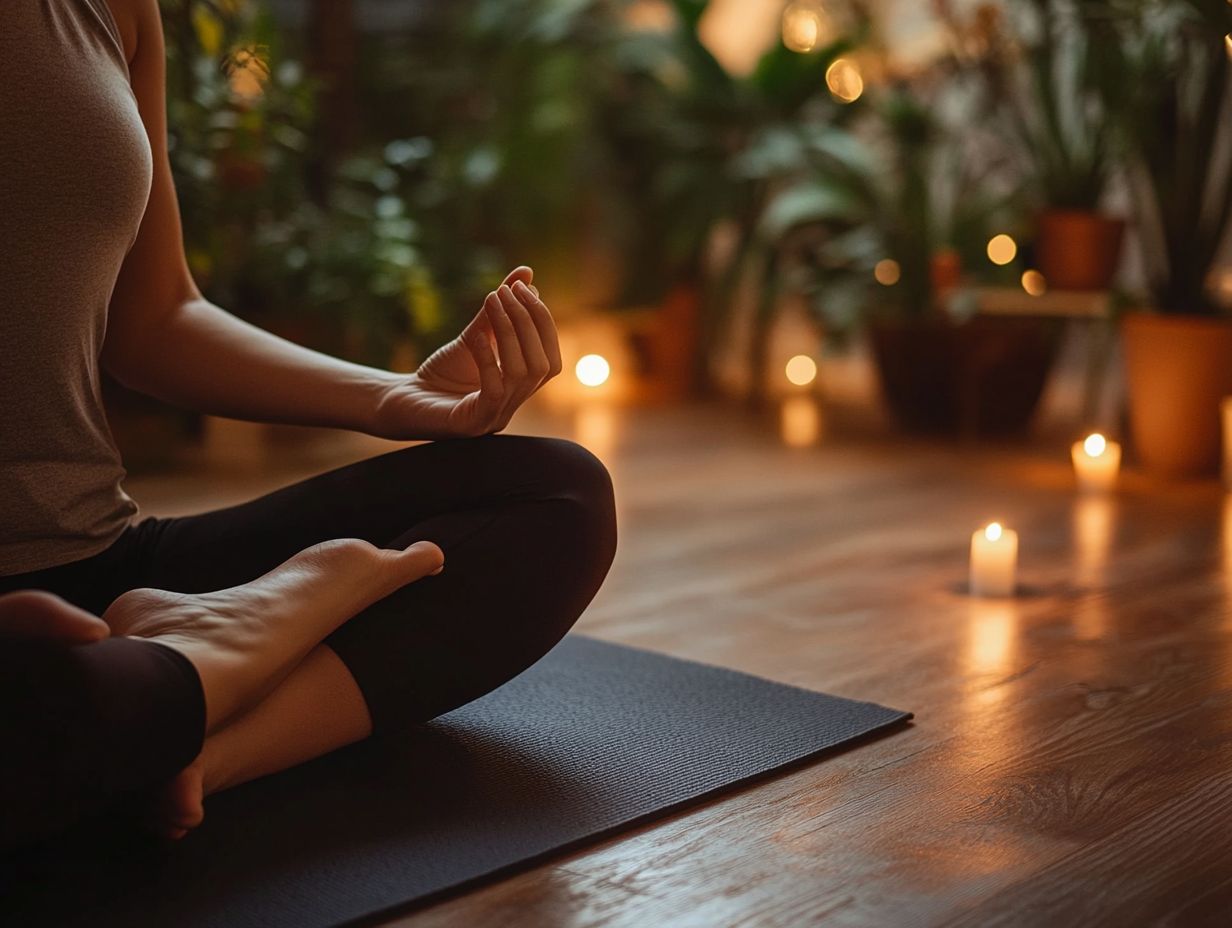
To achieve lasting anxiety relief, it’s crucial to maintain both consistency and effectiveness in your mindfulness practices. One practical approach is to designate specific times throughout your day solely for this purpose.
Whether you choose morning to set a positive tone or evening to unwind, these moments should be free from distractions. Using reminders like alarms or sticky notes can significantly boost your commitment to this habit.
Over time, assessing the impact of these practices will be beneficial. Consider journaling your feelings after each session or noting shifts in your overall mood. This reflection enables you to make ongoing adjustments, ensuring that your mindfulness routine aligns with your evolving needs.
Additional Strategies for Managing Anxiety
Effectively managing anxiety often demands a multifaceted approach. Combining healthy lifestyle changes with therapy and medication options can significantly enhance your mental well-being.
Healthy Lifestyle Changes
Embracing healthy lifestyle changes, such as regular exercise and balanced nutrition, is essential for managing anxiety and enhancing your overall mental well-being.
A consistent exercise routine can boost your endorphins, naturally elevating your mood and reducing stress. Engaging in activities like yoga, running, or dancing cultivates a deeper sense of well-being and helps clear your mind.
A diet rich in whole foods, including fruits, vegetables, whole grains, and lean proteins, supports stable energy levels and improves brain function. Proper nutrition is vital for the chemicals in the brain that help regulate emotions.
Prioritizing quality sleep improves cognitive performance and emotional resilience, allowing you to cope better with daily stressors and reduce anxiety symptoms.
Therapy and Medication Options
Therapy and medication are vital elements of a comprehensive anxiety management plan. They offer a range of approaches to help alleviate your symptoms.
One effective method is cognitive behavioral therapy (CBT), which focuses on modifying unhelpful thought patterns and behaviors.
Excitingly, there are many medication options that can help, from selective serotonin reuptake inhibitors (SSRIs) to benzodiazepines, each designed to address different levels of anxiety and individual responses.
It s essential that your treatment plan is tailored to your needs, ensuring you engage with strategies that resonate with you.
Integrating mindfulness practices into these plans can enhance your coping mechanisms, helping you stay grounded while navigating anxiety with greater ease.
Here s a video that provides further insights into managing anxiety effectively.
Preguntas Frecuentes
1. Qu son las pr cticas mente-cuerpo y c mo pueden ayudar con la ansiedad?
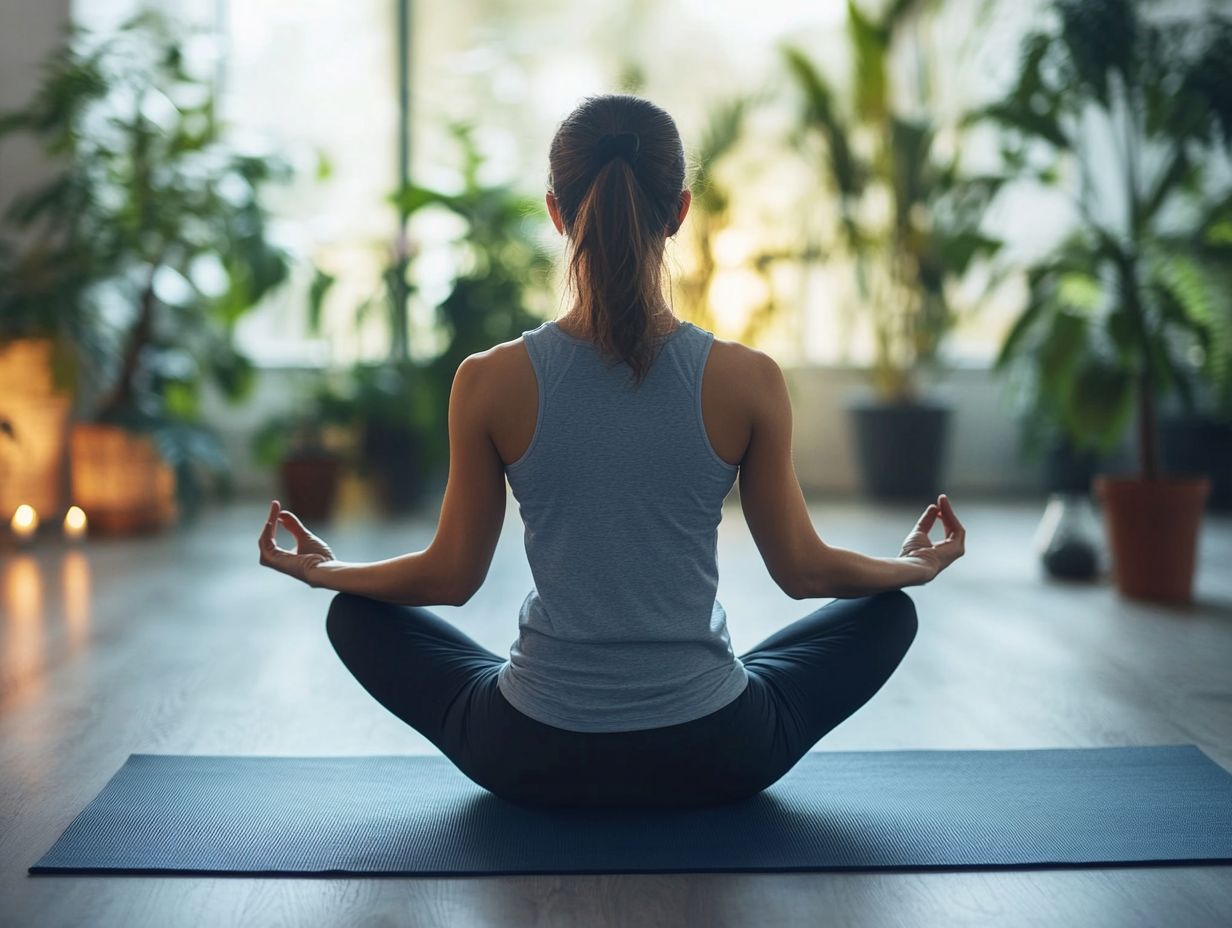
Las pr cticas mente-cuerpo son t cnicas que enfatizan la conexi n entre la mente y el cuerpo, mejorando el bienestar general. Incluyen meditaci n, yoga, respiraci n profunda y atenci n plena. Pueden ayudar con la ansiedad al promover la relajaci n y reducir el estr s, adem s de mejorar la autoconciencia y manejar pensamientos y emociones ansiosos.
2. C mo ayuda la meditaci n a superar la ansiedad?
La meditaci n es una herramienta poderosa para manejar la ansiedad, ya que te permite concentrarte en el momento presente y calmar la mente. La pr ctica regular puede reducir los niveles generales de estr s y mejorar la regulaci n emocional. Mediante la atenci n plena, puedes aprender a dejar ir los pensamientos ansiosos y encontrar paz interior.
3. Puede el yoga ayudar con la ansiedad?
S , el yoga puede ser una forma efectiva de reducir la ansiedad. La combinaci n de movimiento, trabajo de respiraci n y atenci n plena en el yoga puede liberar tensi n f sica y promover la relajaci n. Tambi n fomenta la autoconciencia y la autoaceptaci n, ayudando a manejar pensamientos y emociones ansiosos. La pr ctica regular mejora el bienestar general y proporciona una mente m s tranquila.
4. C mo pueden los ejercicios de respiraci n profunda aliviar la ansiedad?
Los ejercicios de respiraci n profunda, o respiraci n diafragm tica, pueden aliviar la ansiedad al activar la respuesta de relajaci n del cuerpo. Al profundizar y ralentizar tu respiraci n, aumentas el flujo de ox geno a tu cerebro, promoviendo calma y reduciendo s ntomas de ansiedad. Tambi n te ayuda a concentrarte en el momento presente y dejar ir pensamientos ansiosos.
Considera probar estas estrategias para gestionar la ansiedad y mejorar tu bienestar general.
5. Es posible superar la ansiedad solo con actividades que conectan mente y cuerpo?
Las actividades que conectan mente y cuerpo son muy tiles para manejar la ansiedad. Sin embargo, si los s ntomas son severos o persistentes, es crucial buscar ayuda profesional.
Estas pr cticas pueden complementar el tratamiento tradicional y mejorar tu bienestar general. Encuentra un equilibrio entre ambos enfoques para superar la ansiedad de manera efectiva.
6. C mo puedo incorporar actividades que conectan mente y cuerpo en mi rutina diaria?
Puedes incorporar pr cticas mente-cuerpo de varias formas emocionantes! Reserva un tiempo espec fico cada d a para meditar o hacer yoga.
Tambi n puedes practicar ejercicios de respiraci n profunda cada vez que te sientas abrumado. La atenci n plena se puede incluir en actividades cotidianas como comer, caminar o ducharte.
Encuentra lo que m s te guste y convi rtelo en un h bito. Prioriza tu bienestar mental y f sico hoy mismo!

